At a glance, the video looks like a TikTok. But toward the bottom, where a TikTok’s caption would be, are two large buttons. One reads “Respect But Disagree.” The other reads “Convinced By You.” Across the top is a question, written in white: “Should Dems pack the Court?”
“Hell no,” declares a young woman, whom the app labels “Naomi, Political Science” onscreen. “If Republicans are elected in the future, they’re now going to be more likely to stack the court as well.” Swipe up and “Brian, Founder, Oxford Political Review” appears to express an opposing viewpoint. “As much as I believe Democrats ought uphold norms of civility or neutrality and all that, in theory, look: The reality is it’s dirty, and it’s time we fight back,” Brian declares. Brian’s video is the top-voted video on court-packing, having earned a combined 17 “Respect But Disagree” and “Convinced By You” votes since its posting. Naomi’s video is in fourth place, with four.
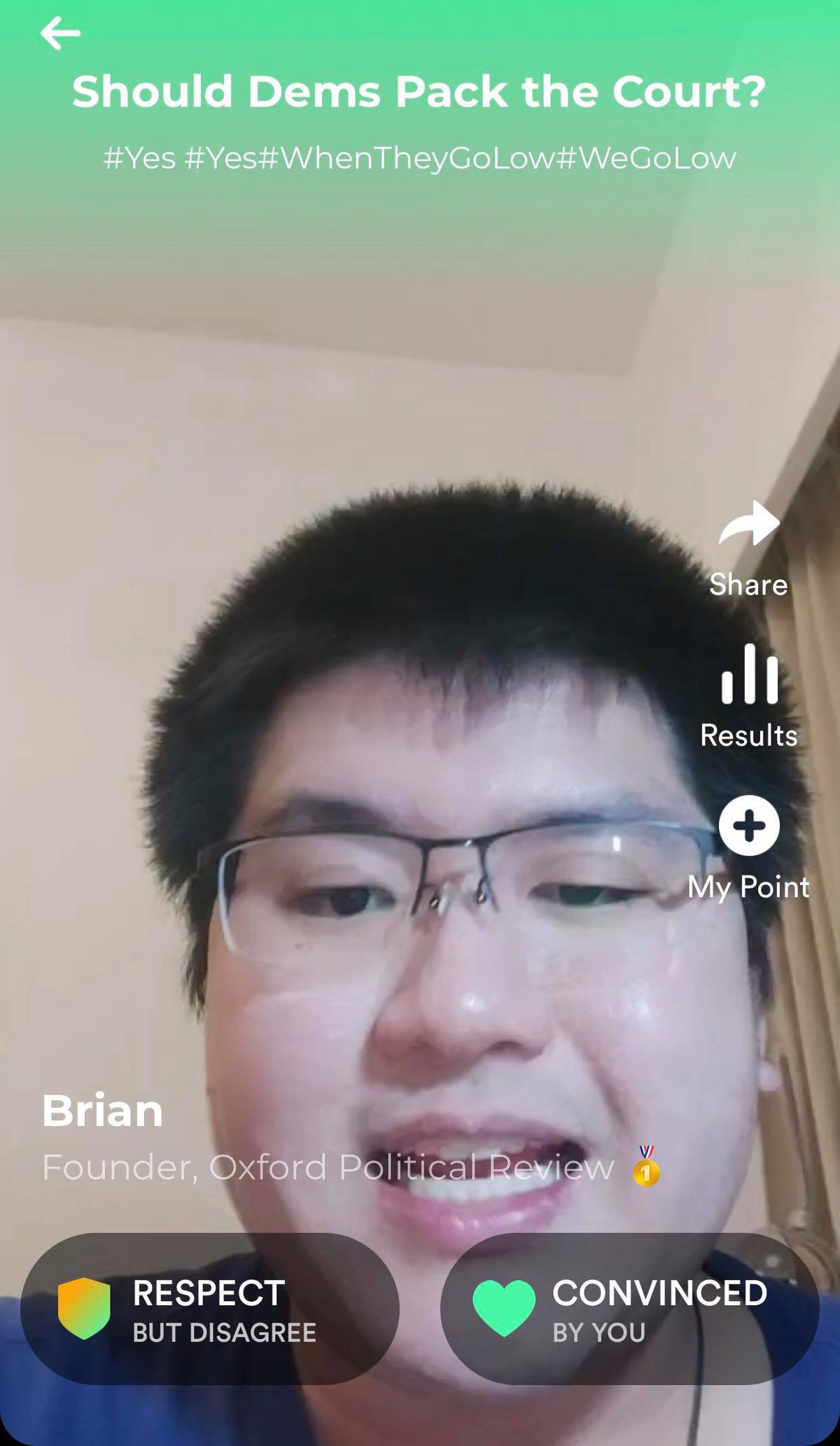
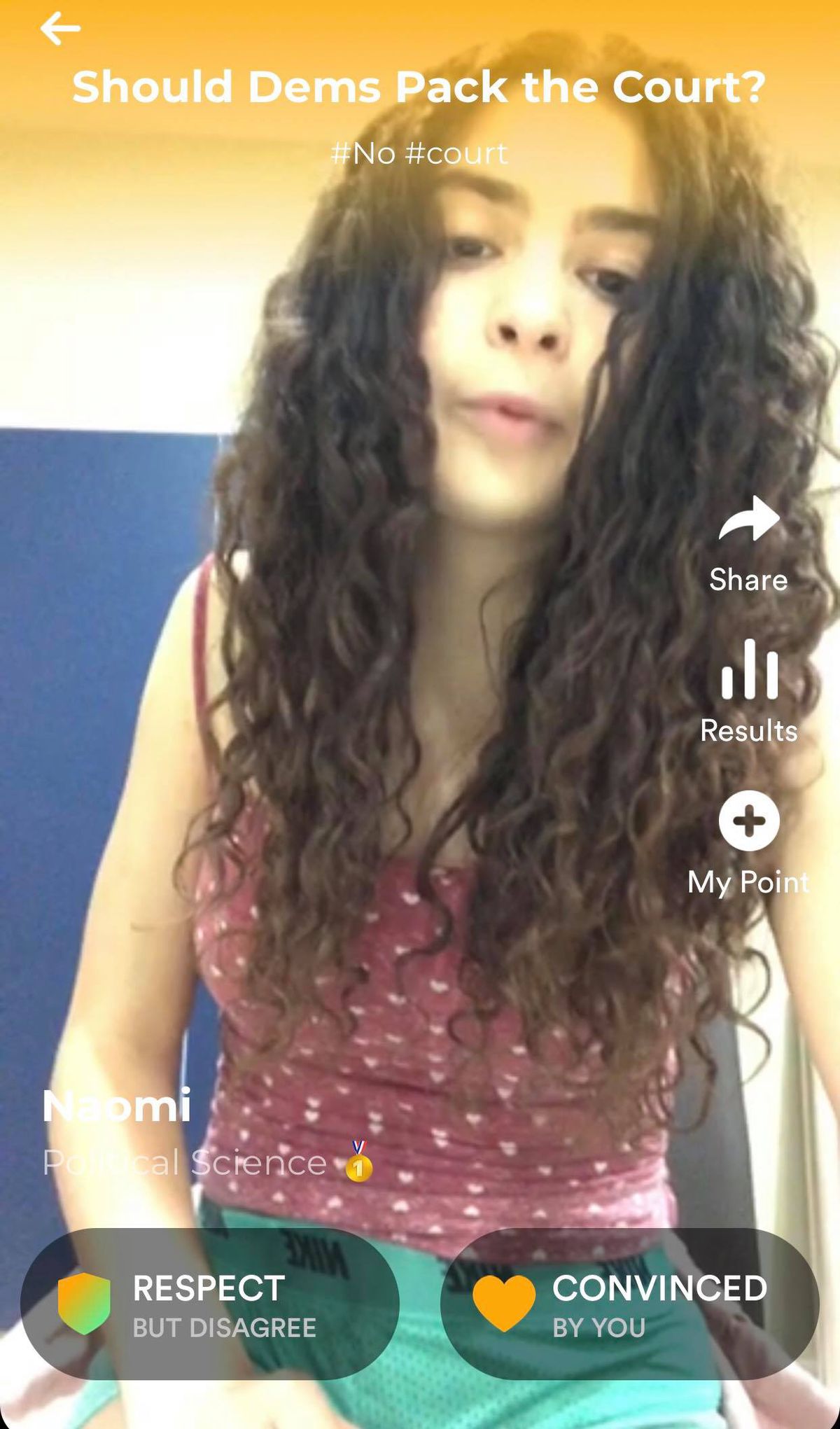
This is Polemix, a new, exclusive app aimed at promoting free discourse among young people. As the world’s biggest social networks continuously battle misinformation and draw controversial lines between dangerous and appropriate speech, the founders of Polemix believe they’ve found a better solution: a free market of ideas, with selective admission. So far, the app has attracted a young community that’s eloquent, outspoken, and passionate about the app’s stated philosophy. But it has also served as a microcosmic experiment with online debate culture in concentrated form, and a real-world demonstration of the caveats required to bring such a lofty ideal to life.
“Naomi” is Naomi Panovka, a rising third-year student at McGill. “Brian” is Brian Wong, a Rhodes scholar studying politics at Oxford. The two were selected earlier this year as part of a group that Polemix’s founders refer to as “Leaders” — 40 elite young people who were tasked with building the app’s community while driving its early dialogue.
“It was people who are quite passionate about public speaking in general, who cared about discourse,” Panovka says. “People who they thought would be good representatives.”
There was no formal application to become a Leader — the founders hand-picked the group through their networks. Per Polemix’s website, the cadre includes “some of the world’s top thinkers.” The founders describe them as “very carefully selected university leaders.” In practice, the vast majority of the listed group are decorated high school and college debaters. Panovka competed for Canada’s national team in high school and has reached the finals of over 10 university-level competitions; Wong was a semifinalist at the 2020 world championships. The group is diverse when it comes to race, gender, and nationality, but famous universities are heavily represented. Cambridge, Oxford, LSE, and Yale all make several appearances on the list and can claim a majority of the listed Leaders as students or alumni.
College debate was formative for Polemix founder and CEO Ian Sielecki. He competed during his time as a student at Cambridge and has organized public debates for the Athens Democracy Forum. Sielecki has long felt that social media could learn from the college debate scene; he sees Polemix as a tool to combat online echo chambers.
“Social networks, by the way they operate through their algorithms, they only give you content that you already agree with, which means they radicalize you,” says Sielecki. The idea behind Polemix, he says, “was to create, inspired from the magic of debating, a conceptual landscape in which people would hear, listen to the outside by design.”
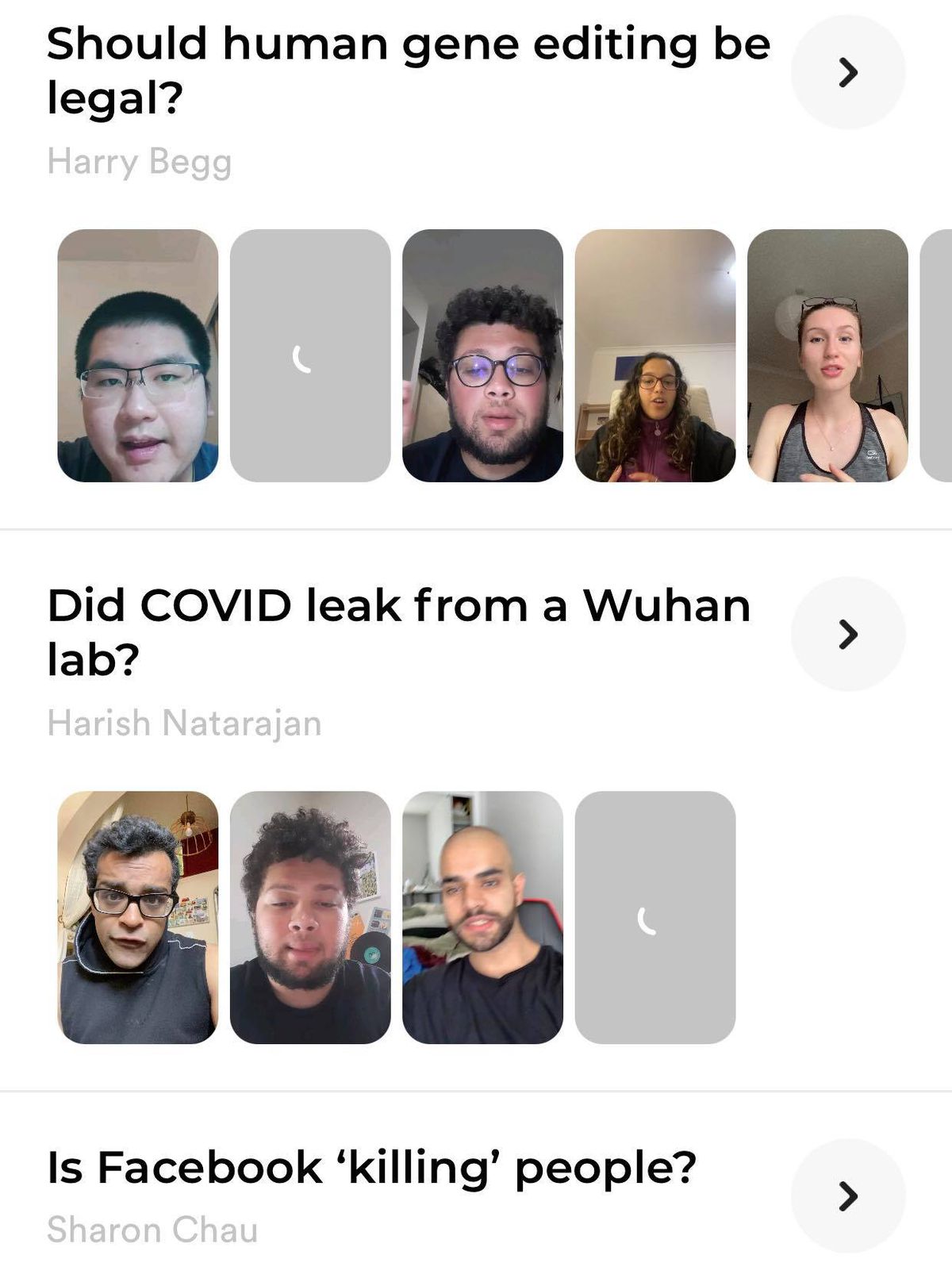
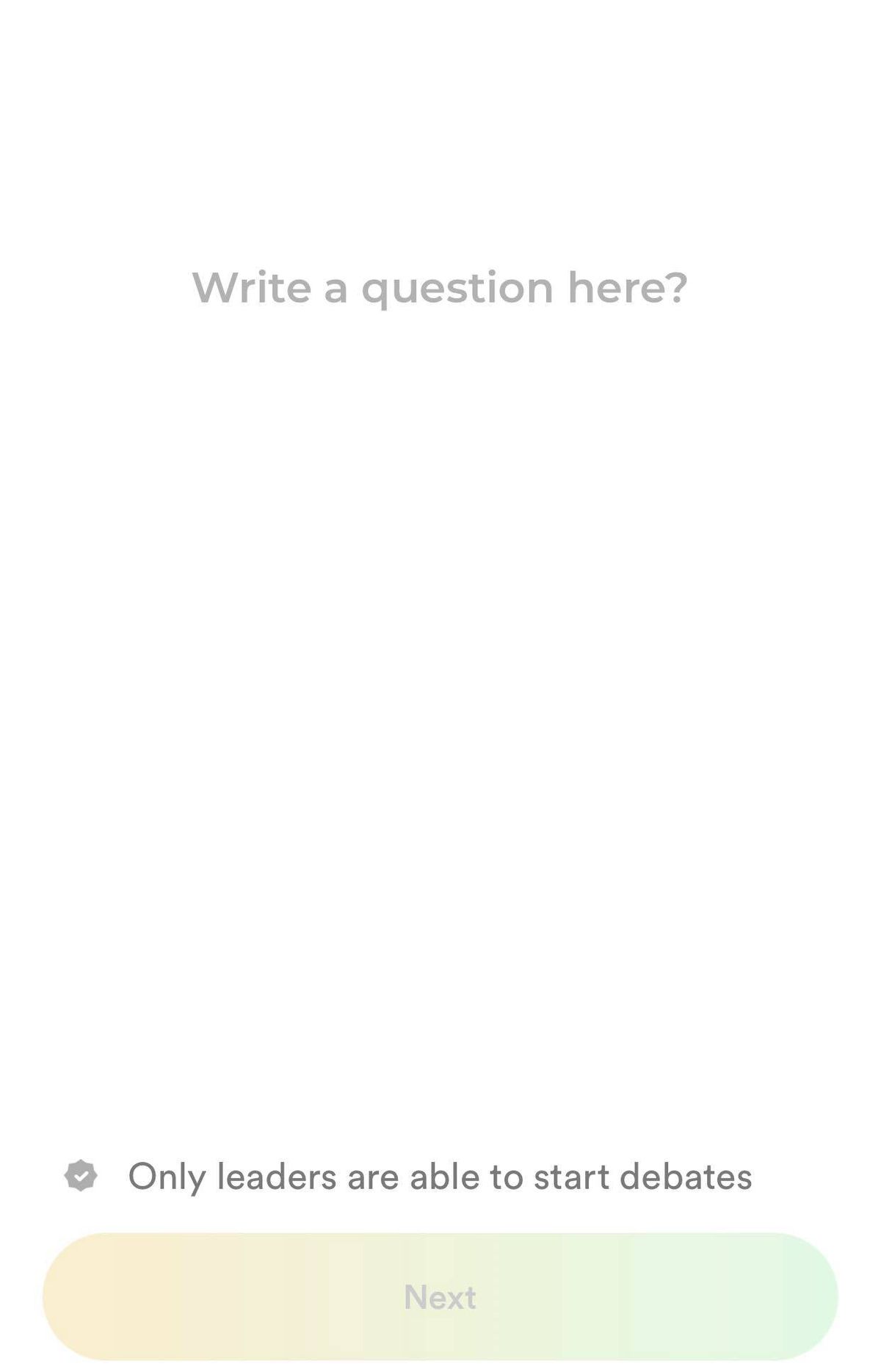
Early on, Sielecki and his team identified young people as their target audience. Specifically, “young people passionate about something,” according to Ismaël Emelien, Sielecki’s co-founder. Emelien isn’t a college debater, but rather a cofounder of France’s En Marche political party and a former adviser to French President Emmanuel Macron. But he feels that Sielecki’s frustrations map to the global political landscape. “People just … can’t listen to the other side anymore,” Emelien says. “This is the first thing we need to fix in real life. The way to do that is to target young people.”
Polemix’s interface borrows a lot from TikTok — swipe down for a new video, everything capped at 30 seconds — but the content couldn’t be more different. Every Polemix video features a person making an argument for or against a preset list of questions, from “Will Federer win Wimbledon?” and “Is Canada superior to America?” to “Does Instagram objectify women?” and “Is physician-assisted suicide unethical?” As a user scrolls, they’re shown videos for each question in groups of up to four: a “Hell Yes,” a “Hell No,” a “Hell Yes,” a “Hell No.” They can vote, or scroll, accordingly.
The algorithm takes both “Convinced By You” and “Respect But Disagree” votes into account when prioritizing the videos you see. As Sielecki notes, “The Respect But Disagree is quite important for your video to be popular.”
Every social media platform grapples with harassment and outright hate speech, but Polemix walks a particularly difficult line because its explicit goal is to celebrate differences of opinion. The app does have an explicit rule against hate speech: “Hate is for losers” is its slogan, one that Sielecki emphasizes in pitching the app, and one that was attractive to some of the initial members.
“The idea is to welcome people from every side of every controversial question. We will have people from the Trump administration, from QAnon making videos,” Emelien says. “That’s not a problem for us, as long as it is expressed in respect for the rules of Polemix, meaning it’s not hateful.” He emphasizes that “the people watching this video will be exposed, by design, to the other side arguing against those videos … That’s our remedy.” (Of course, that also means a user won’t necessarily see a representative sample of opinions. “Has #MeToo gone too far?” has 10 “Hell No” responses and just four “Hell Yes” responses, but a scrolling user will still see two of each — arguably giving more contrarian views an easier path to exposure.)
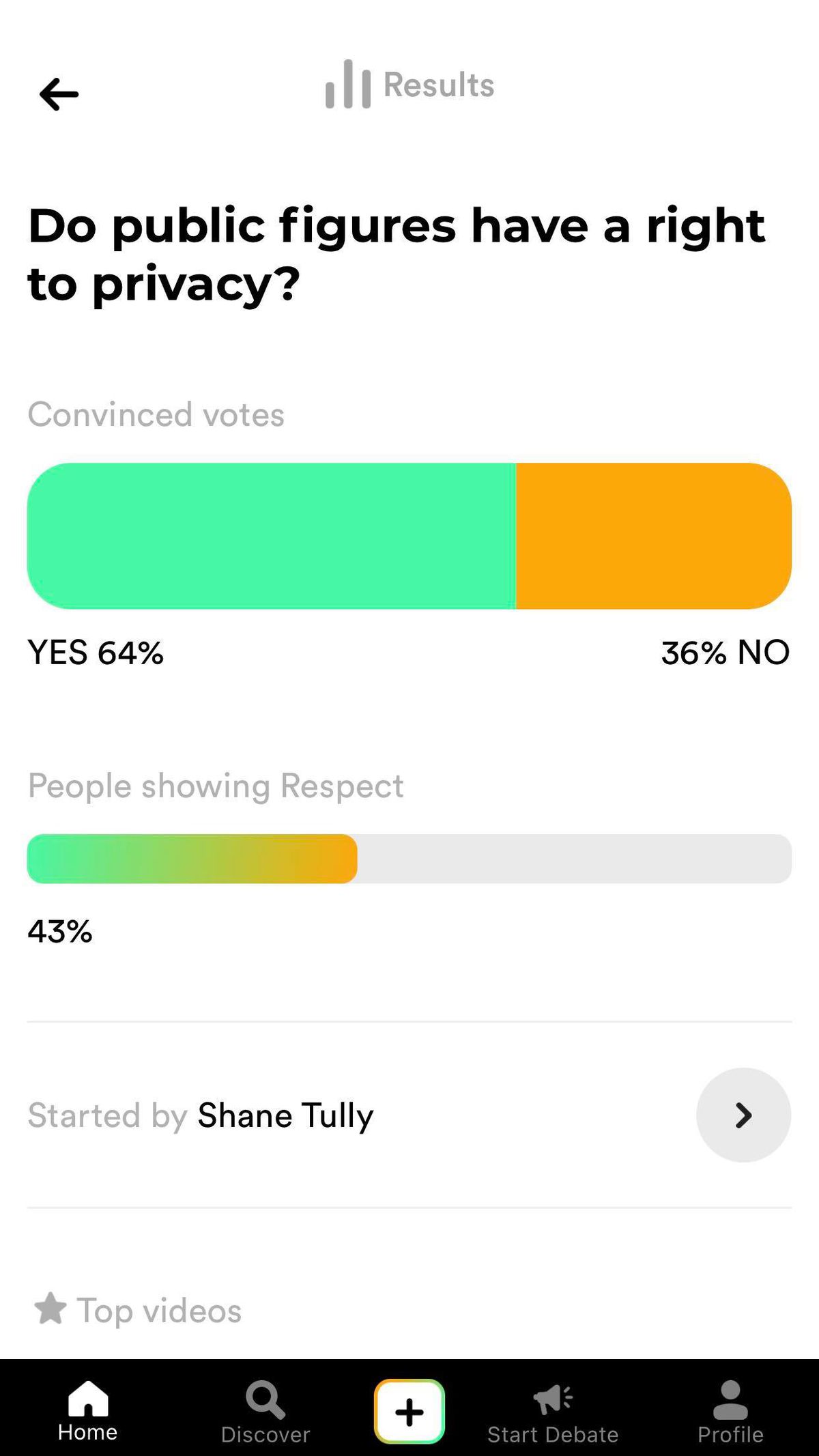
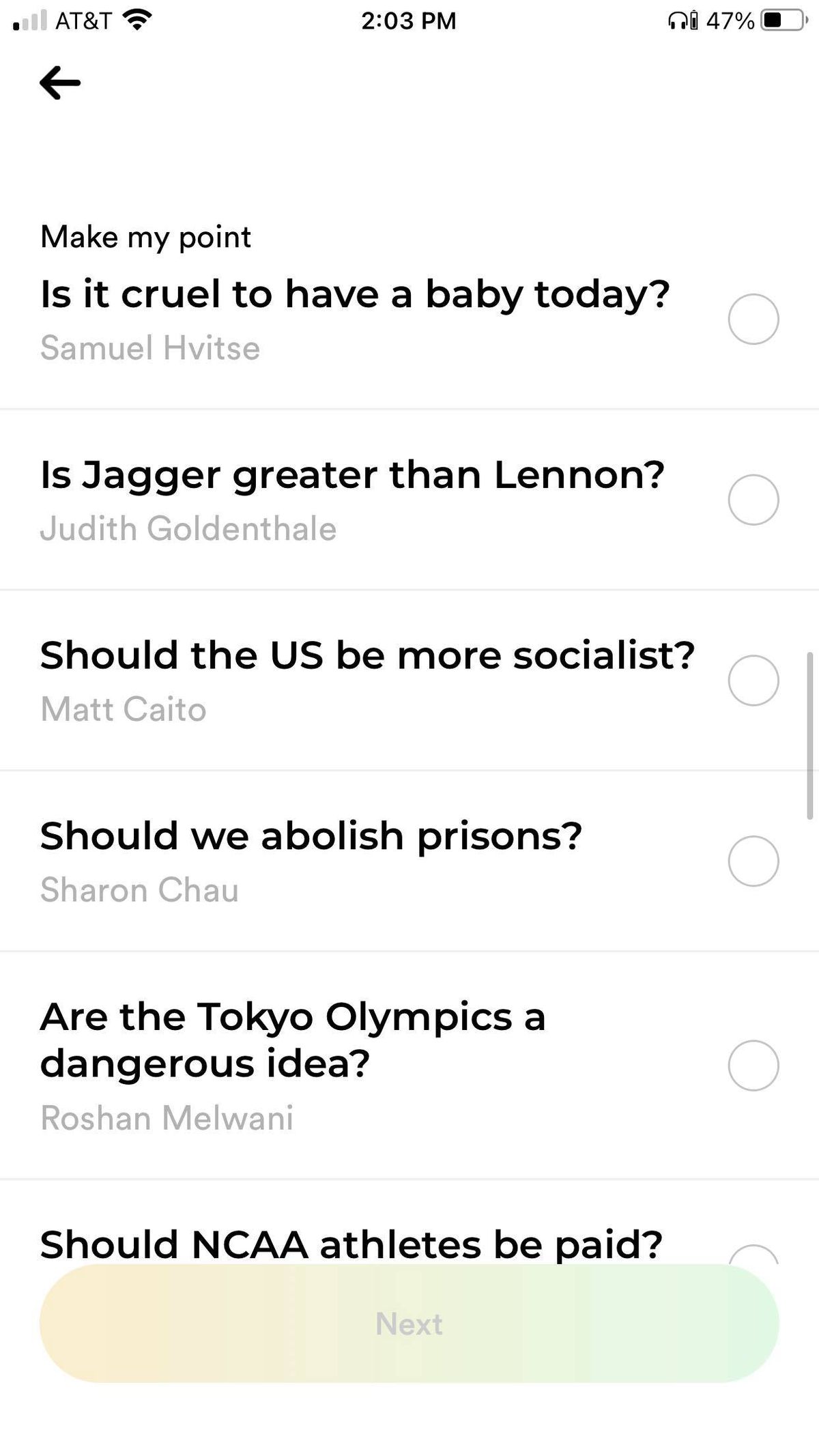
The other tool reining in the discourse is the questions users are asked to respond to, which set the tone for the conversations that follow. For Polemix’s first few months, only Leaders have been able to create new questions, a major privilege that sets them apart from the rest of the community. Many of the Leaders are acquainted through the debate community and discuss new questions behind the scenes.
Sielecki and Emelien agree that some questions are so conducive to bigotry as to be off-limits; debates about “race science,” no matter how respectful, would be a no-go. Asked how the team goes about drawing that line, Sielecki replied, “It’s relatively clear what racism is.”
But the app has touched on just about every controversial issue you might think of, and some questions that have gotten the green light would likely be in a gray area, if not over the line, for progressive circles on and off the internet. “Should Cosby be left in peace?”, “Is Pride Day still necessary?”, “Should IQ tests be mandatory?”, “Is JK Rowling transphobic?”, “Has political correctness gone too far?”, “Is America racist?”, “Did COVID leak from a Wuhan lab?”, and “Did religion get homosexuality wrong?” have all been debated on Polemix since the app’s founding. Even with safeguards in place, founders who endorse these questions are drawing an ideological line, however unconsciously — one that puts a high degree of trust in their community.
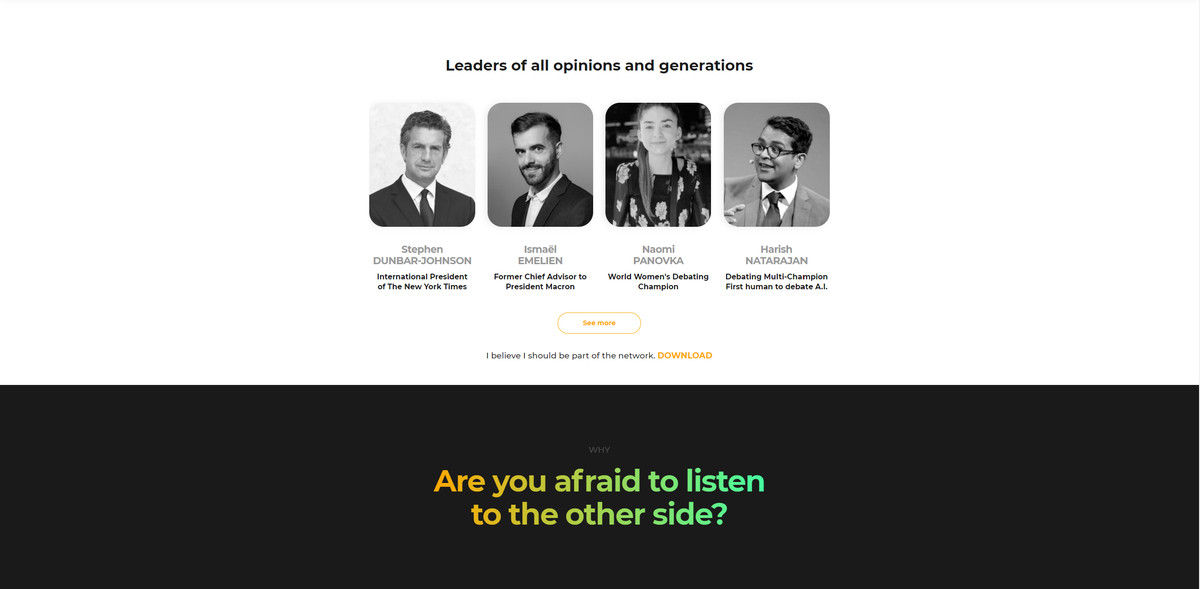
So far, Polemix has mostly avoided the right-wing lurch many might expect from a platform focused on quick-twitch debating. As of this writing, a “Hell yes” is winning “Should we tax to eliminate billionaires?” and “Should we have a universal basic income?”; a “Hell No” is winning “More restriction on immigration?” and “MLB too woke?” A “Hell Yes” is winning “Should we abolish prisons?” and “Should we abolish the police?” by a significant margin. None of the users I spoke to seem to have remotely right-wing political beliefs. Wong describes themself as “a hardcore progressive.” And the users I spoke to universally love Polemix’s environment and find the community supportive and engaging.
“It’s Reddit meets Twitter, but instead of Twitter trolls and Reddit downvoters who swarm you, you’ve just got high-quality or relatively high-quality discourse,” says Wong, who spends one to two hours on Polemix every day. “I’ve very rarely, if at all, seen any content that’s reminiscent of hate speech.” Sielecki and Emelien say they’ve had very few issues with trolls so far. “One out of every thousand is a hater,” Sielecki estimates.
Amanda Timerman, who’s not a leader (she learned about Polemix at a party), says the app’s intellectual community is “therapeutic” for her. “Instagram, Facebook, Twitter, everything there, it’s like the minute you say something … you’re going to be immediately judged,” Timerman says. Polemix, she feels, is “really and truly a safe space … It really makes me feel good, and it makes me feel really self-confident to have an opinion on things that normally I wouldn’t discuss.” She added, “It’s like my own personal talk show.”
The prospect of young people hosting their own talk shows online isn’t always a recipe for enlightened discourse, as the swamp of online debate challenges demonstrates. The spectacle of those challenges has proven to be a good way for influencers to build hype and attract new audiences on platforms like YouTube and Twitch, but the debates themselves often take a back seat to clout-chasing. As popular Twitch commentator Hasan Piker put it in an interview with The Verge, “[I]t’s just pseudo-intellectual wrestling. It’s sport, and it’s not productive … People just want to beat their opponent, so they’re not necessarily ideologically shifting anyone. Instead, the 20 percent of the audience that is maybe malleable gravitates toward whoever the top-dog debater is.”
For Polemix, the challenge is to succeed where YouTube and Twitch have mostly failed: essentially, to build a platform where trolls don’t win. Polemix’s founders are confident in their algorithm, and so are the users I spoke to. “A lot of the social media debates that you see online — vitriolic, bitter, vicious, surly. It’s just not polite,” Wong says. But on Polemix, “It’s just people talking. And people talking humanely.”
But Polemix is still invite-only, with only 2,500 users (and a waitlist of “a couple of thousand,” per Sielecki), and it’s not clear how well the platform will fare if the reins are loosened. The founders are in the process of rolling out question-setting privileges to more users, and new Leaders will need to meet a minimum threshold of video views and votes. Emelien and Sielecki also plan to start adding more users soon — they recently offered invitations to all participants in the 2021 university world championships. They don’t, however, know if or when they’ll be letting the masses in.
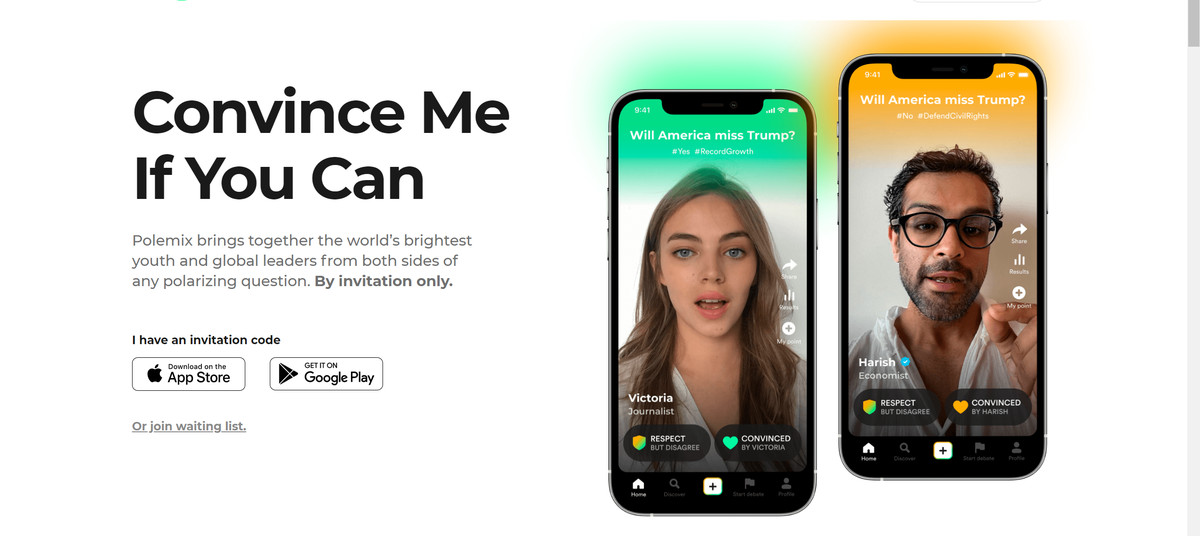
“We ensure that we have quality every step of the way,” Sielecki says. “We’re not going to grow massively just to grow, without taking care of the safety that the ecosystem offers to users and the quality of the content that is being created.” In other words: there’s no timeline yet.
Among Leaders and members, there are some doubts about whether Polemix will be able to court non-debaters as it grows. Some members are nervous about changing the community’s character. “Right now, it kind of feels like I’m in a little cocoon,” Timerman says, though she’s aware that “the only way to grow is to eventually open it up.”
But Wong is confident enough in the community’s passion and values that they’re not worried about trolls. For them, the floodgates can’t open soon enough. “I’m very excited,” they say. “I can’t wait until we have unleashed the kraken.”
https://www.theverge.com/22588932/polemix-app-tiktok-clone-students-invite-only-debating-app

